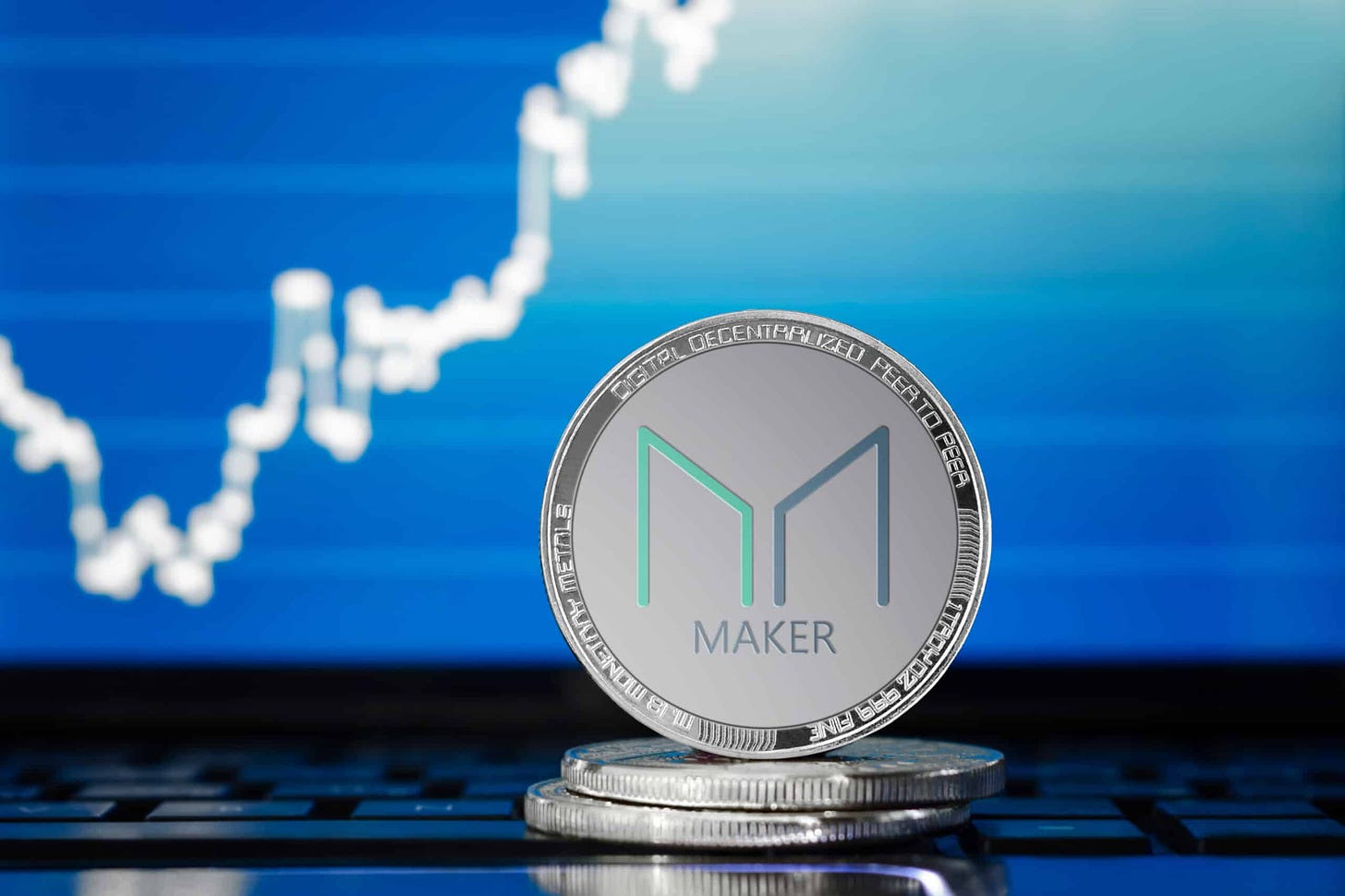The Hottest Memecoin 🥵
Weekly News Recap: 🚀 Kraken’s new blockchain, 🐋 French trader’s $45M Trump bets, ✅ SEC greenlights Bitcoin ETF options, 🔄 MakerDAO’s rebrand debate, and more!
You are reading the Unchained Weekly newsletter, where we cover all the major news in the crypto space, providing insights into the market's latest trends, regulatory shifts, and technological advancements. Stay informed with your no-hype resource for all things crypto.
The Backstory of How 3 AI Agents Led to the Rise of the Hottest Memecoin, GOAT
The intersection of artificial intelligence and cryptocurrency is gaining momentum with the rise of memecoins like GOAT, an AI-created token now valued at over $700 million.
The two-week-old GOAT memecoin, which hit a market cap of almost $880 million on Thursday, is captivating everyone in crypto. Not because this is memecoin szn, but because its rise was fueled by an AI called Truth Terminal, which is itself, a baby of two other AI models.
Teng Yan, founder of Chain of Thought, joins Unchained to break down how this unexpected AI creation has turned into a phenomenon, why it has captured the attention of the crypto world, and what the future holds for AI-driven tokens.
At the end, Laura also discusses with Unchained’s regulatory reporter Veronica Irwin two interesting and important news stories: who Kamala Harris is vetting for SEC chair and how one Senate race could inadvertently give Senator Elizabeth Warren more power over crypto.
Listen to the episode on Apple Podcasts, Spotify, Pods, Fountain, Podcast Addict, Pocket Casts, Amazon Music, or on your favorite podcast platform.
Weekly News Recap
Kraken Set to Launch Its Own Blockchain in 2024
Kraken, one of the world’s oldest crypto exchanges, plans to launch its own blockchain called Ink early next year, Bloomberg reported. The blockchain will be focused on decentralized finance (DeFi) applications, enabling users to trade, borrow, and lend tokens without intermediaries. A developer testnet for Ink will be available later this year, with the full rollout expected in the first quarter of 2025.
Ink will be an Ethereum Layer 2 solution powered by Optimism’s OP Stack, which also powers Coinbase’s Base. Kraken aims to make DeFi more accessible and user-friendly by integrating Ink’s apps into its Kraken Wallet. More than a dozen apps, including decentralized exchanges, will be available upon Ink’s debut.
Kraken’s strategy follows the success of Binance’s BNB Chain and Base. Kraken plans to initially serve as the blockchain’s sequencer and manage transactions, but will eventually decentralize this function. The exchange has around 40 people working on Ink as part of its broader expansion into new products and markets, and doesn’t have plans for a token.
Person Behind Massive Pro-Trump Bets on Polymarket Identified as French Trader
Polymarket, the most prominent crypto-based prediction market platform, has identified a French national as the individual behind more than $45 million in bets favoring Donald Trump’s victory in the upcoming U.S. presidential election. The revelation follows an internal investigation by the platform, which confirmed that the trader, operating under the username "Fredi9999" and three other accounts, has an extensive background in financial services and trading experience.
Polymarket’s investigation found no evidence of market manipulation, with the company stating, “This individual is taking a directional position based on personal views of the election.” The trader has agreed not to open additional accounts without prior notice.

Earlier in the week, Bloomberg reported that Polymarket had begun tightening restrictions on users in order to ensure compliance with its ban on allowingtraders based in the U.S. to use the platform. Polymarket is re-verifying the locations of its largest accounts after concerns arose about users circumventing the ban by using VPNs.
Polymarket’s main election market has seen nearly $2.4 billion in trading volume, with Trump’s implied probability of winning standing at 61.6%, higher than on competing platforms.
SEC Approves CBOE and NYSE to List Bitcoin ETF Options
The U.S. Securities and Exchange Commission (SEC) has approved the New York Stock Exchange (NYSE) and CBOE Global Markets to list options tied to bitcoin exchange-traded funds (ETFs). This green light allows the two exchanges to offer options for ETFs provided by Fidelity, Grayscale, VanEck, and other firms, following similar approval given to Nasdaq in September.
These approvals represent another step to expand market access to crypto-based financial products, continuing a trend that began with the approval of spot bitcoin and ether ETFs earlier this year. The SEC’s accelerated approval process has fueled speculation about the future regulatory landscape for crypto-tied products.

In this week’s episode of the Bits + Bips podcast, Jeff Park of Bitwise emphasized the significance of this move, noting that ETF options will enable greater participation in the bitcoin market through financial tools such as stock lending and cross-asset collateralization. James Seyffart, an ETF expert at Bloomberg, predicted these products could roll out by Q1 2025, signaling further growth in institutional adoption.
ECB Paper on Bitcoin Utility Sparks Criticism From Industry Experts
A European Central Bank (ECB) paper, authored by Ulrich Bindseil and Jürgen Schaaf, argues that Bitcoin's increasing value could have negative societal impacts due to its lack of real utility beyond being a speculative asset. The paper claims that Bitcoin has not fulfilled its original promise of becoming a global peer-to-peer payment system and instead serves primarily as a store of value, which could lead to wealth concentration and social harm.
However, the crypto community has pushed back on these assertions. Columbia Business School professor Omid Malekan offered a rebuttal, arguing that Bitcoin's value lies in its role as financial protection from inflation, confiscation, and censorship. He highlighted that these qualities provide long-term societal benefits, even if the cryptocurrency is not used for everyday transactions. Also, on Bits + Bips, economist Alex Kruger dismissed the ECB's stance as “a joke.”
Stripe Acquires Stablecoin Platform Bridge for $1.1 Billion
Stripe has finalized a $1.1 billion deal to acquire Bridge, a fast-growing stablecoin infrastructure platform. The acquisition, confirmed by both companies, underscores Stripe's ongoing efforts to expand its cryptocurrency capabilities. Bridge, founded by former Square and Coinbase executives Zach Abrams and Sean Yu, has quickly scaled its business by providing cross-border payment solutions and supporting government aid disbursements in Latin America.
This move signals Stripe’s growing interest in stablecoin technology, following other major financial institutions such as Visa and SWIFT, which have begun integrating stablecoins into their operations. Bridge’s CEO Zach Abrams highlighted the platform's rapid growth, saying “We’re now helping hundreds of developers worldwide, moving billions in payment volume.”
Nigeria Drops Money Laundering Charges Against Binance Executive
The Nigerian government has dropped money laundering charges against Tigran Gambaryan, a senior executive at cryptocurrency exchange Binance, allowing him to seek medical treatment abroad. Gambaryan, who has been detained in Nigeria since February, faced accusations of laundering $35.4 million, which both he and Binance have denied. His health deteriorated while being held at Kuje Correctional Centre, with his family raising concerns about a worsening herniated disc.
The charges were withdrawn by Nigeria’s Economic and Financial Crimes Commission (EFCC), citing Gambaryan’s need for medical attention. “We have withdrawn the money laundering charges... to allow him to get treatment outside the country,” EFCC lawyer Ekele Ihenacho said. However, tax evasion charges leveled by Nigeria against Binance will continue in court.
Gambaryan’s detention drew international attention, including appeals from U.S. politicians. Binance maintained that Gambaryan was not a key decision-maker at the company. The executive had been held in custody since his arrest earlier this year, alongside a colleague who later escaped the country.
MakerDAO Considers Returning to Maker Brand After Sky Rebrand Falls Short
Just four weeks after MakerDAO rebranded itself to “Sky,” the group is reevaluating the decision, with the community preparing to vote on whether to revert back to the Maker brand. Maker co-founder Rune Christensen proposed switching back to MakerDAO after receiving feedback that the move, which included replacing MKR with the SKY token for governance, caused confusion.
The rebrand was part of Maker’s "Endgame" upgrade, designed to introduce new elements such as USDS (an upgrade of the DAI stablecoin) and "Sky Stars" (formerly SubDAOs). However, many users were unclear on Sky’s role and hesitant to convert their MKR tokens to SKY, with only 8% of MKR holders making the switch so far.
Christensen admitted that “SKY didn’t do what I expected,” citing challenges with adoption by centralized exchanges. A governance vote on November 4 will determine if Maker will return to its original brand and keep MKR as the sole governance token.
Buenos Aires Introduces Blockchain-Based Digital IDs for Citizens
Argentina’s capital, Buenos Aires, has rolled out QuarkID, a decentralized digital identity system for its 3.6 million residents. Powered by ZKsync’s zero-knowledge cryptography, this new blockchain-based solution enhances privacy and security. Integrated with MiBa, the city’s digital platform for interacting with the government, QuarkID allows citizens to securely manage documents such as birth certificates and tax records.
The initiative aims to give residents more control over their personal data, with plans to expand the service to include other documents such as driver’s licenses. Officials view this as a groundbreaking move toward modernizing government services through the use of blockchain technology.







